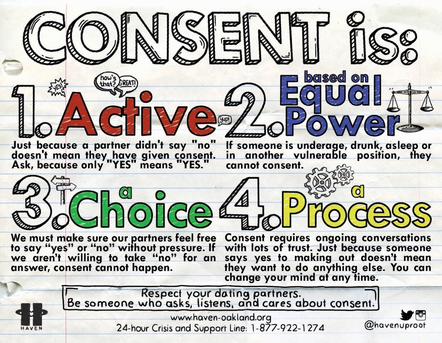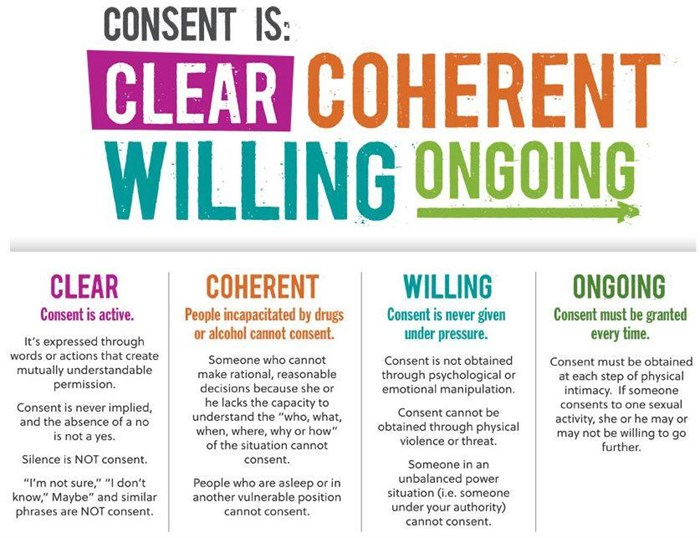Harvey Weinstein, Brett Kavanaugh, Bill Cosby, Louis CK, Kevin Spacey, Matt Lauer… the list goes on and on. But how many of us know about Lysette Anthony, Christine Blasey Ford, Andrea Constand, Julia Wolov, Daniel Beal, and the many other strong individuals who have been victimized? How many of us can say #metoo? With changing social norms, consent is a topic that we need to discuss. The earlier we start this discussion, the better. Consent is needed for more than just sex – consent is multi-tiered.
When most teens think about sex, they often forget the events that need to happen beforehand. Many teens view consent as simply not saying no, but there is much more to it. Consent is enthusiastic, coherent, freely given, and ongoing. Enthusiastic consent means that it is a clear YES. The absence of no does not equal consent. Only “yes” means yes, and “no” means no (loveisrespect.org). Coherent consent means that the people involved have a clear understanding of what is happening and are able to give their enthusiastic consent. Being under the influence of any substances or in any position where one is incapacitated and unable to comprehend what is happening means that consent cannot be given. If someone cannot answer “who”, “what”, “when”, “where”, “why”, or “how” questions about the situation, they cannot give their consent. Also, if someone is under the legal age of consent, it does not matter if they say “yes” because they are unable to give consent. The age of consent varies from state to state, in Michigan it is 16. There are laws that delve deeper into the nuances of age gaps, however the age of consent is still 16. Freely given consent is given without the use of force or pressure. If you ask 37 times and receive “no” as an answer 37 times, receiving “yes” as an answer to the 38th time does not mean you have consent. It means you have pressured this person and wore them down until they said “yes”. Also, after true consent has been received, it is important to understand that it is ongoing. Consent is needed for each step taken: just because consent is given for one act does not mean it is given for all acts. Consent can also be revoked at any time – if someone gives their enthusiastic, coherent, freely given consent, they are allowed to change their mind. Once consent is taken back, continuing to engage in the (physical) situation is assault.
When most teens think about sex, they often forget the events that need to happen beforehand. Many teens view consent as simply not saying no, but there is much more to it. Consent is enthusiastic, coherent, freely given, and ongoing. Enthusiastic consent means that it is a clear YES. The absence of no does not equal consent. Only “yes” means yes, and “no” means no (loveisrespect.org). Coherent consent means that the people involved have a clear understanding of what is happening and are able to give their enthusiastic consent. Being under the influence of any substances or in any position where one is incapacitated and unable to comprehend what is happening means that consent cannot be given. If someone cannot answer “who”, “what”, “when”, “where”, “why”, or “how” questions about the situation, they cannot give their consent. Also, if someone is under the legal age of consent, it does not matter if they say “yes” because they are unable to give consent. The age of consent varies from state to state, in Michigan it is 16. There are laws that delve deeper into the nuances of age gaps, however the age of consent is still 16. Freely given consent is given without the use of force or pressure. If you ask 37 times and receive “no” as an answer 37 times, receiving “yes” as an answer to the 38th time does not mean you have consent. It means you have pressured this person and wore them down until they said “yes”. Also, after true consent has been received, it is important to understand that it is ongoing. Consent is needed for each step taken: just because consent is given for one act does not mean it is given for all acts. Consent can also be revoked at any time – if someone gives their enthusiastic, coherent, freely given consent, they are allowed to change their mind. Once consent is taken back, continuing to engage in the (physical) situation is assault.
Now, back to consent being multi-tiered: consent does not only apply to physical, sexual acts. Consent is broader and is important for all ages. Talking with children about the factors of consent is important for growth. The younger we talk about consent with children, the better we prepare them to navigate the world. Teaching our children about consent helps them establish boundaries with others and helps them understand what behaviors are and what behaviors are not okay. Consent is not only important for adults and teenagers: children also have the right to say no to harmful touching and interactions. “We should never assume anyone is okay with anything, whether that’s a sexual act, a group activity, a conversation, or a financial decision that affects them” (Weiss). Non-sexual consent can refer to topics of conversation, not giving away personal information, getting everyone’s opinion before setting up group activities, asking before taking photographs, and before non-sexual touching (Weiss). Non-sexual touching can include hugging, nudging, kissing, and other seemingly innocuous acts. Just because you might be okay with kissing in public or nudging someone who’s in your way, it does not mean that others who are involved are okay with these acts as well. It’s important to discuss boundaries before interacting with others– set up a baseline of things that are okay to discuss and things that are not and communicate things you are okay with and things you are not. Communication is critical to all types of relationships, whether new or old. Overall, consent is vital when interacting with others. Consent must be given by both parties and must follow all the criteria. Watch this video and then think of it this way: if you wouldn't force someone to drink tea, why would you force someone to engage in other acts?
References
http://www.familyplanning.org.nz/media/153561/feature-consent-stop-sexual-violence-oct-2014_700x538.jpg
https://havenuproot.files.wordpress.com/2014/05/consentmagnet_small3-2.jpg
https://www.loveisrespect.org/content/helping-your-teen-set-boundaries/
https://everydayfeminism.com/2015/11/practice-consent-beyond-sex/
https://www.youtube.com/watch?v=fGoWLWS4-kU
http://www.familyplanning.org.nz/media/153561/feature-consent-stop-sexual-violence-oct-2014_700x538.jpg
https://havenuproot.files.wordpress.com/2014/05/consentmagnet_small3-2.jpg
https://www.loveisrespect.org/content/helping-your-teen-set-boundaries/
https://everydayfeminism.com/2015/11/practice-consent-beyond-sex/
https://www.youtube.com/watch?v=fGoWLWS4-kU


 RSS Feed
RSS Feed
